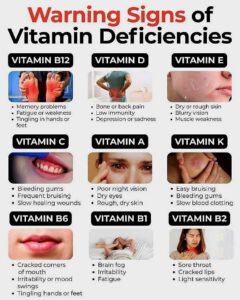
Here is a detailed article that expands on the warning signs of vitamin deficiencies.
Listen to Your Body: Common Warning Signs of Vitamin Deficiencies
In our fast-paced lives, it’s easy to dismiss persistent aches, pains, or fatigue as just part of being busy. However, these symptoms can often be your body’s way of signaling a nutritional deficiency. The provided chart offers a brilliant at-a-glance guide to the potential warning signs linked to a lack of essential vitamins.
Understanding these signals is the first step toward addressing the root cause. Let’s delve deeper into what your body might be trying to tell you.
The B-Complex Family: Energy and Nerves
Vitamin B12
· Warning Signs: Memory problems, fatigue or weakness, tingling in hands or feet.
· What it means: B12 is crucial for healthy nerve function and red blood cell formation. A deficiency can manifest as “pins and needles” (paresthesia) and cognitive issues like brain fog and memory lapses. The fatigue stems from a form of anemia where your body can’t transport oxygen efficiently.
Vitamin B6
· Warning Signs: Cracked corners of the mouth, irritability or mood swings.
· What it means: B6 is a key player in mood regulation through the production of neurotransmitters like serotonin. It also supports skin health, and a deficiency can lead to angular cheilitis—the painful cracks at the corners of your lips.
Vitamin B1 (Thiamine)
· Warning Signs: Brain fog, irritability, fatigue.
· What it means: Thiamine is essential for converting food into energy. Without it, your brain and muscles are starved of fuel, leading to mental fatigue, confusion, and physical tiredness.
Vitamin B2 (Riboflavin)
· Warning Signs: Sore throat, cracked lips, light sensitivity.
· What it means: Riboflavin is vital for maintaining the health of your skin and mucous membranes (like the inside of your mouth and throat). A deficiency can cause inflammation, leading to a sore, red throat and chapped lips.
The Bone and Immunity Regulators
Vitamin D
· Warning Signs: Bone or back pain, low immunity, depression or sadness.
· What it means: Known as the “sunshine vitamin,” D is critical for calcium absorption. Without it, your bones can become soft and painful. It also plays a significant role in immune function and mood regulation, with strong links to seasonal affective disorder and depression.
Vitamin K
· Warning Signs: Easy bruising, bleeding gums, slow blood clotting.
· What it means: Vitamin K is the “clotting vitamin.” It activates the proteins that help your blood to coagulate. A deficiency means even a minor bump can cause a significant bruise, and small cuts may bleed for longer.
The Antioxidant Protectors
· Warning Signs: Dry or rough skin, blurry vision, muscle weakness.
· What it means: Vitamin E is a powerful antioxidant that protects your cells from damage. This is especially important for skin health and eye health. A deficiency can lead to oxidative damage, resulting in dry skin and vision problems.
Vitamin C
· Warning Signs: Bleeding gums, frequent bruising, slow healing wounds.
· What it means: Vitamin C is essential for producing collagen, the main structural protein in skin, blood vessels, and gums. When levels are low, gums become weak and bleed easily, wounds take longer to heal, and blood vessels are fragile, leading to easy bruising.
Vitamin A
· Warning Signs: Poor night vision, dry eyes, rough, dry skin.
· What it means: Vitamin A is fundamental for vision, particularly in low-light conditions (hence “night blindness”). It also supports the health of the conjunctiva (the membrane covering the eye) and skin cells.
What to Do If You Experience These Symptoms
1. Do Not Self-Diagnose: While this chart is a helpful guide, many of these symptoms can overlap with other health conditions. It is crucial to consult a healthcare professional for a proper diagnosis.
2. Get Tested: A simple blood test can confirm most vitamin deficiencies.
3. Focus on a Balanced Diet: The best way to get your vitamins is through a varied and colorful diet.
· B12: Meat, eggs, dairy, fortified cereals.
· Vitamin D: Fatty fish, egg yolks, fortified milk, and sunlight.
· Vitamin C: Citrus fruits, bell peppers, broccoli, strawberries.
· Vitamin A: Orange vegetables (carrots, sweet potatoes), leafy greens, eggs.
4. Consider Supplementation Wisely: If you are deficient, your doctor may recommend supplements. Always take them under medical guidance, as megadoses of certain vitamins can be harmful.
Paying attention to these subtle warning signs is a powerful form of proactive health care. By listening to your body, you can identify potential deficiencies early and take steps to nourish yourself back to optimal health.
